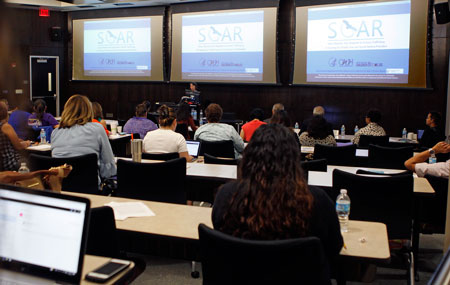Originally published October 17, 2016
By Laura L. Acosta
UTEP Communications
Human trafficking victims are highly likely to come into contact with health professionals in emergency rooms, clinics and other health care settings. Yet providers may not know what signs to look for or what questions to ask in order to identify and appropriately assist a human trafficking victim.
That is why the College of Health Sciences at The University of Texas at El Paso hosted a free training in fall 2016 for 102 social workers, social work graduate students, nurses and behavioral health and public health professionals to identify, treat and offer a lifeline to potential victims and survivors of sex and labor trafficking.

Offered by the U.S. Department of Health and Human Services (DHHS), Administration for Children and Families, SOAR (Stop. Observe. Ask. Respond to Human Trafficking) is designed to help health care and social services providers identify victims of human trafficking and learn how to safely intervene.
A 2014 study in the Annals of Health Law found that 87.8 percent of domestic sex trafficking survivors reported that they came into contact with someone within the health care system while being trafficked.
“We all need to be educated because unless we stop and observe and respond, we could actually be working with human trafficking victims or survivors, and not know it,” said Eva Moya, Ph.D., College of Health Sciences’ associate dean and social work associate professor. “We brought this training to UTEP because we want to bring greater awareness about human trafficking. Most of us interact with others, whether it’s in the workforce, in the field, in a hospital or in a health care setting, and we want to be educated on how to stop and observe and respond to potential victims of human trafficking.”
Human trafficking is a crime involving the exploitation of someone for the purpose of compelled labor or a commercial sex act through the use of force, fraud or coercion.
While statistics vary, the International Labour Organization estimates that there are 18.7 million individuals worldwide who are being exploited by individuals or enterprises. Of these, 4.5 million are victims of forced sexual exploitation and 14.2 million are victims of forced labor exploitation in industries such as agriculture, construction, domestic work or manufacturing.
In Texas, domestic work was one of the top industries for labor trafficking, according to the National Human Trafficking Resource Center hotline.
Human trafficking victims, including children, teenagers, men and women, are often difficult to identify because they usually don’t see themselves as victims or seek help.
“The victims are traumatized by the experience and they need to be sheltered and protected from their trafficker,” said UTEP Social Work Professor Mark Lusk, Ed.D, who represents the College of Health Sciences on the El Paso Human Trafficking Task Force. The task force is a collaborate effort between law enforcement and social services in El Paso to detect and provide services to victims of human trafficking and to prosecute traffickers. “Human trafficking is a complete violation of the humanity of the person who is being trafficked because you take away their free will and then use them for your own purposes.”
To show examples of force, fraud or coercion, the SOAR facilitator presented case studies of real life human trafficking experiences, which helped participants recognize red flags that will alert them to potential victims, such as signs of physical abuse or trauma, a fearful and submissive demeanor, or being accompanied by a controlling person who refuses to allow the individual to speak to a provider alone.
The training also offered strategies to identify and interact with a potential human trafficking victim by building trust and asking specific questions about his or her experience if red flags are raised.
At the end of the session, participants identified local, state and national referral networks that can provide critical services to potential trafficking victims, such as the Paso del Norte Center of Hope, a local organization that leads anti-trafficking efforts in the region through outreach, education and victim-centered services.
Jessica Spohn, a student in UTEP’s Master of Social Work program, not only learned what red flags to look for in a potential victim, but she also came away with a list of resources to turn to for help in order to provide potential trafficking victims the most competent service.
“I think the most important part of this training as it applies to my future career as a public health social worker is that you never know who you are working with that may be a trafficked person, and there’s no room for assumptions,” said Spohn, who also has a graduate degree in public health.
At the end of the training, participants were asked to serve as SOAR ambassadors and share their knowledge on human trafficking with other health care and social services providers.
Carla Ellis, a clinical nursing instructor at UTEP, plans to teach students in her community nursing class how to apply the different stages of disease prevention – primary, secondary and tertiary – to human trafficking.
“That was very interesting to me,” Ellis said after the facilitator explained how primary, secondary and tertiary prevention can help prevent, reduce and manage the lasting effects of human trafficking. “I haven’t seen it so specifically applied to human trafficking. I think this would be very applicable to a low socio-economic (area), but as (the facilitator) said, ‘Human trafficking affects everybody.’”
If you believe you have information about a potential trafficking situation, call the National Human Trafficking Resource Center toll-free hotline at 888-373-7888.